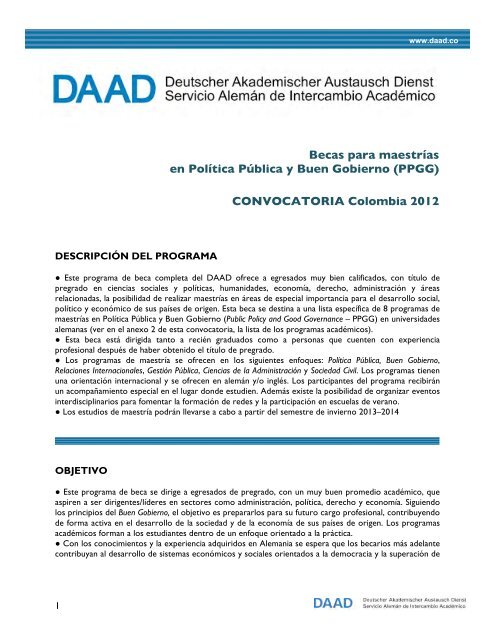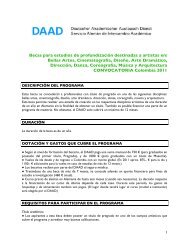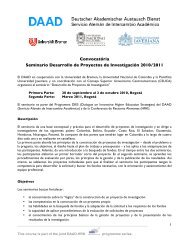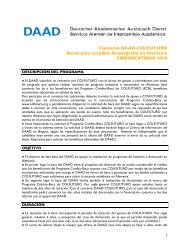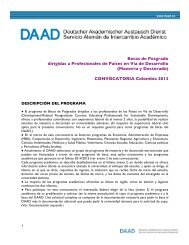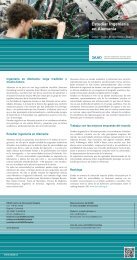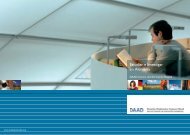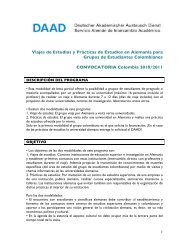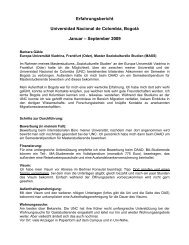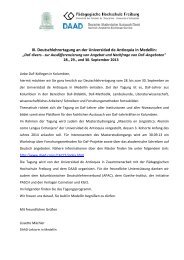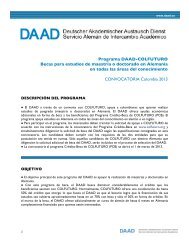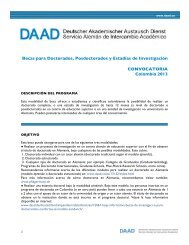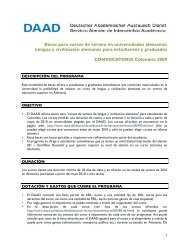convocatoria - Daad
convocatoria - Daad
convocatoria - Daad
You also want an ePaper? Increase the reach of your titles
YUMPU automatically turns print PDFs into web optimized ePapers that Google loves.
DESCRIPCIÓN DEL PROGRAMA<br />
● Este programa de beca completa del DAAD ofrece a egresados muy bien calificados, con título de<br />
pregrado en ciencias sociales y políticas, humanidades, economía, derecho, administración y áreas<br />
relacionadas, la posibilidad de realizar maestrías en áreas de especial importancia para el desarrollo social,<br />
político y económico de sus países de origen. Esta beca se destina a una lista específica de 8 programas de<br />
maestrías en Política Pública y Buen Gobierno (Public Policy and Good Governance – PPGG) en universidades<br />
alemanas (ver en el anexo 2 de esta <strong>convocatoria</strong>, la lista de los programas académicos).<br />
● Esta beca está dirigida tanto a recién graduados como a personas que cuenten con experiencia<br />
profesional después de haber obtenido el título de pregrado.<br />
● Los programas de maestría se ofrecen en los siguientes enfoques: Política Pública, Buen Gobierno,<br />
Relaciones Internacionales, Gestión Pública, Ciencias de la Administración y Sociedad Civil. Los programas tienen<br />
una orientación internacional y se ofrecen en alemán y/o inglés. Los participantes del programa recibirán<br />
un acompañamiento especial en el lugar donde estudien. Además existe la posibilidad de organizar eventos<br />
interdisciplinarios para fomentar la formación de redes y la participación en escuelas de verano.<br />
● Los estudios de maestría podrán llevarse a cabo a partir del semestre de invierno 2013–2014<br />
OBJETIVO<br />
● Este programa de beca se dirige a egresados de pregrado, con un muy buen promedio académico, que<br />
aspiren a ser dirigentes/líderes en sectores como administración, política, derecho y economía. Siguiendo<br />
los principios del Buen Gobierno, el objetivo es prepararlos para su futuro cargo profesional, contribuyendo<br />
de forma activa en el desarrollo de la sociedad y de la economía de sus países de origen. Los programas<br />
académicos forman a los estudiantes dentro de un enfoque orientado a la práctica.<br />
● Con los conocimientos y la experiencia adquiridos en Alemania se espera que los becarios más adelante<br />
contribuyan al desarrollo de sistemas económicos y sociales orientados a la democracia y la superación de<br />
1<br />
www.daad.co<br />
Becas para maestrías<br />
en Política Pública y Buen Gobierno (PPGG)<br />
CONVOCATORIA Colombia 2012
2<br />
www.daad.co<br />
desigualdades sociales. Adicionalmente los estudios en las universidades alemanas deben calificar a los<br />
becarios de manera especial como interlocutores de la política y la economía alemanas.<br />
● Por medio de este programa el DAAD quiere hacer una contribución al fomento del Buen Gobierno y a<br />
las estructuras de la sociedad civil en los países seleccionados.<br />
DURACIÓN<br />
● Por lo general 24 meses de estudio de maestría. Adicionalmente antes del inicio de los estudios, se<br />
ofrece a todos los becarios un curso de alemán en Alemania de hasta 6 meses (independientemente de si<br />
el programa académico es en inglés o en alemán).<br />
DOTACIÓN Y GASTOS QUE CUBRE EL PROGRAMA<br />
● 750 € mensuales para manutención y vivienda.<br />
● Vuelos de ida y regreso a Colombia con un monto global.<br />
● Seguro médico.<br />
● Se concede además un aporte financiero para fines de estudio e investigación (460 € anual).<br />
● Curso previo de alemán en Alemania de hasta seis meses (incl. alojamiento, alimentación etc.).<br />
● En caso de que el becario viaje con familia se puede conceder un apoyo económico adicional (276<br />
€/mes para el/la cónyuge y 184 €/mes por hijo) y un curso de idioma para el cónyuge (hasta 1550 €). El<br />
DAAD también cubre el seguro médico para el/la cónyuge.<br />
● En caso de que los costos de alquiler sean excepcionalmente altos se puede conceder una ayuda<br />
adicional.<br />
REQUISITOS PARA PARTICIPAR EN EL PROGRAMA<br />
Nota importante<br />
● Para participar en esta <strong>convocatoria</strong> los candidatos deben cumplir tanto con los requisitos mencionados<br />
en este documento, como con los requisitos adicionales estipulados por la universidad alemana de<br />
acuerdo al programa académico escogido.
3<br />
www.daad.co<br />
● En el anexo 2 de esta <strong>convocatoria</strong> se encuentra la lista de las maestrías ofrecidas y sus respectivas<br />
descripciones, así como los datos de contacto. Los candidatos deben contactar a la persona encargada de<br />
la respectiva maestría y consultar su página web para informarse acerca de los requisitos adicionales de la<br />
universidad.<br />
● Sólo los candidatos que cumplan con los requisitos establecidos por el DAAD en esta <strong>convocatoria</strong> y<br />
con los requisitos exigidos por la respectiva maestría serán tenidos en cuenta en el proceso de selección.<br />
Requisitos del DAAD<br />
● Los candidatos deben tener razones muy bien argumentadas que sustenten su interés en realizar una<br />
maestría en Alemania en concordancia con el significado de la formación adquirida para su país de origen.<br />
(Ver Objetivo del programa arriba.) La carta de motivación es parte fundamental de la postulación)<br />
● Los candidatos deben tener un título universitario de pregrado en alguna de las áreas cubiertas por el<br />
programa (o en áreas relacionadas) y acreditar un muy buen promedio académico. (También se aceptan<br />
postulaciones de candidatos que ya hayan obtenido un título de especialización o maestría.)<br />
● Para todos los programas el DAAD exige un buen nivel de inglés (normalmente certificado con el<br />
TOEFL, de mínimo 550). En muchos casos la universidad puede pedir un nivel más alto el cual deberá ser<br />
cumplido por el candidato.<br />
El postulante puede aclarar con la universidad si eventualmente acepta también otros certificados de inglés<br />
oficiales (IELTS, Cambridge, etc.) y en dado caso debe confirmar los puntajes mínimos exigidos por la<br />
universidad para cada uno de ellos.<br />
● Para programas de maestría en alemán o combinados (alemán e inglés) conocimientos básicos del<br />
alemán en el momento de la solicitud. Lo ideal sería que el candidato haya terminado el nivel A2 al<br />
momento de la postulación para garantizar que aprobará el examen de alemán (B2/C1) una vez termine el<br />
curso preparatorio de hasta seis meses ofrecido como parte de la beca.<br />
● No serán tenidas en cuenta las postulaciones de candidatos que al momento de presentarse a la<br />
<strong>convocatoria</strong> hayan obtenido su último título académico hace más de 6 años.<br />
● No se pueden tener en cuenta solicitudes de candidatos que en el momento de solicitar la beca lleven<br />
más de un año en Alemania.<br />
● No existe un límite de edad.<br />
● No es requisito contar con experiencia profesional para poder presentarse a este programa.<br />
CÓMO CONCURSAR/ DOCUMENTACIÓN REQUERIDA<br />
Recomendamos leer cuidadosamente esta información. Las posibilidades de ser seleccionados se<br />
incrementan en la medida en que se cumpla con los requisitos y se sigan las instrucciones aquí<br />
consignadas. Las postulaciones no podrán estar acompañadas de documentos y recomendaciones<br />
diferentes a las solicitadas. Con respecto a los requisitos y a la entrega de las postulaciones completas, el<br />
DAAD no acepta ninguna excepción.
La postulación se entrega en el Centro de Información del DAAD en Bogotá.<br />
4<br />
www.daad.co<br />
Solicitud al programa de beca y cupo al programa académico<br />
● Para concursar en este programa de beca, tanto la solicitud de beca del DAAD, como la solicitud de cupo<br />
a las diferentes universidades, se hacen simultáneamente. Hasta la fecha de cierre los candidatos deben<br />
entregar sólo la documentación requerida en esta <strong>convocatoria</strong>. No obstante, es probable que algunas<br />
universidades pidan documentación adicional para llevar a cabo el proceso de admisión después de haber<br />
sido seleccionado como becario.<br />
Nota: Algunas universidades (por ej. Hertie School of Governance) piden que los candidatos realicen el<br />
registro online necesario para la admisión incluso antes de la fecha de cierre de la presente <strong>convocatoria</strong>.<br />
Los candidatos se deben informar directamente con la universidad sobre estos procesos.<br />
Solicitud múltiple<br />
● Un candidato puede postularse como máximo a tres de los programas de estudios ofrecidos. En este<br />
caso, se debe especificar en el formulario del DAAD el orden de preferencia que tiene cada programa<br />
elegido, en la sección destinada para eso (pregunta No 7 en el formulario DAAD, anexo 1 de esta<br />
<strong>convocatoria</strong>).<br />
● Aunque el postulante puede presentarse a más de un programa académico, el DAAD le recomienda<br />
elegir sólo uno, porque la gran mayoría de las universidades prefieren candidatos que se deciden por una<br />
maestría específica como primera y única opción.)<br />
● La solicitud completa se debe entregar en alemán o en inglés.<br />
● El postulante entregará el formulario del DAAD (1) completamente diligenciado con los anexos<br />
correspondientes (2-9) en el centro de información del DAAD en Bogotá. Véase lista abajo.<br />
Lista de la documentación requerida<br />
1. Formulario de solicitud del DAAD<br />
El formulario disponible como anexo 1 de esta <strong>convocatoria</strong> debe estar debidamente diligenciado en inglés<br />
o alemán (instructivo detallado más abajo).<br />
Una vez diligenciado el formulario, se imprime en tamaño carta y se firma (Una postulación con un<br />
formulario sin firma no será aceptada.)<br />
2. Carta de motivación<br />
La carta de motivación debe explicar de forma clara y contundente los motivos académicos, profesionales<br />
y personales que lo conducen a presentarse a esta <strong>convocatoria</strong> y al programa de maestría elegido. La<br />
carta debe incluir también el beneficio que significará la formación del candidato en Alemania para su país<br />
de origen. Si se nombra una segunda/tercera opción de maestría en el formulario de solicitud, la carta de<br />
motivación debe explicar primero en detalle el interés específico en la primera opción de maestría elegida<br />
y además explicar expresamente los motivos de la segunda/tercera opción.<br />
¡Esta carta tiene especial importancia para el proceso de selección! Recomendamos dedicar el tiempo<br />
suficiente para presentar una carta clara y contundente que contenga todos los argumentos que puedan
5<br />
www.daad.co<br />
ser importantes para su aplicación (incluyendo la experiencia académica y profesional anterior, las<br />
proyecciones profesionales después del estudio de la maestría en Alemania, etc.). Recomendamos<br />
entregar por lo menos 2 páginas de carta de motivación. ¡La carta debe tener un título, fecha y firma del<br />
postulante! (Debe ser escrita en alemán o inglés.)<br />
3. Hoja de vida en alemán o inglés<br />
La hoja de vida debe ser completa y debe incluir información relevante y precisa sobre el campo de su<br />
actividad académica y si aplica, información sobre su actividad laboral. La hoja de vida debe ser completa<br />
(cubriendo sin vacíos la totalidad de las actividades académicas y profesionales hasta la fecha de la<br />
postulación). ¡La hoja de vida debe tener la fecha y la firma del postulante!<br />
4. Certificado reciente de idiomas<br />
Para todos los programas de estudio ofrecidos en la presente <strong>convocatoria</strong> el DAAD exige un buen nivel<br />
de inglés (normalmente certificado con el TOEFL, de mínimo 550). En muchos casos la universidad puede<br />
pedir un nivel más alto el cual deberá ser cumplido por el estudiante. El candidato puede aclarar con la<br />
universidad si acepta eventualmente también otros certificados de inglés oficiales (IELTS, Cambridge, etc.)<br />
y en dado caso confirmar los puntajes mínimos exigidos por la universidad para cada uno de ellos.<br />
Para programas de maestría en alemán o combinados (alemán e inglés) se necesitan adicionalmente<br />
conocimientos básicos del alemán en el momento de la solicitud. Lo ideal sería que el candidato haya<br />
terminado el nivel A2 al momento de la postulación para garantizar que aprobará el examen de alemán<br />
(B2/C1) una vez termine el curso preparatorio de hasta seis meses, ofrecido como parte de la beca. Debe<br />
comprobar estos conocimientos a través de un certificado de idioma (Goethe-Institut, Centro de Idioma<br />
u otro).<br />
Los certificados de idioma por regla general no deben ser más antiguos de dos años.<br />
Se deben sacar fotocopias de todos los certificados de idioma y autenticarlas en la Embajada de Alemania<br />
en Bogotá.<br />
5. Dos cartas de recomendación de profesores y/o empleadores actuales<br />
Las cartas de recomendación deben ser escritas en inglés o alemán. Además deben ser recientes (no más<br />
antiguas de 2 meses al momento de cierre de la <strong>convocatoria</strong>). Las cartas forman parte importante de la<br />
solicitud. Recomendamos que el contenido de las cartas no sólo compruebe la idoneidad del postulante<br />
en general, sino que también se refiera explícitamente al programa de maestría elegido y haga énfasis en la<br />
calificación del candidato para el programa específico así como en el futuro beneficio para el solicitante y<br />
su país de origen. ¡Las cartas deben tener fecha y los datos de contacto y firma de la persona que emite la<br />
recomendación! Deben ser dirigidas al DAAD.<br />
6. Copia autenticada del diploma, o de los diplomas de grado a nivel universitario<br />
El diploma de grado debe ser debidamente reconocido por la entidad que lo expidió (Ministerio de<br />
Educación); posteriormente debe ser apostillado por el Ministerio de Relaciones Exteriores para luego ser<br />
traducido al inglés o al alemán por un traductor oficial. Por último se debe sacar una fotocopia y<br />
autenticarla en la Embajada de Alemania en Bogotá (ver Notas abajo).
6<br />
www.daad.co<br />
7. Copia autenticada del certificado de notas de la universidad<br />
El certificado de notas debe ser debidamente reconocido por la entidad que lo expidió (Universidad,<br />
Ministerio de Educación); posteriormente debe ser apostillado por el Ministerio de Relaciones Exteriores,<br />
para luego ser traducido al inglés o al alemán por un traductor oficial. Por último se debe sacar una<br />
fotocopia y autenticarla en la Embajada de Alemania en Bogotá (ver Notas abajo). Si la universidad le<br />
entrega las notas en inglés, no es necesario el paso de la traducción oficial.<br />
8. Copia autenticada del certificado del ICFES<br />
El certificado del ICFES debe ser debidamente reconocido por la entidad que lo expidió (ICFES)<br />
posteriormente debe ser apostillado por el Ministerio de Relaciones Exteriores, para luego ser traducido<br />
al inglés o al alemán por un traductor oficial. Por último se debe sacar una fotocopia y autenticarla en la<br />
Embajada de Alemania en Bogotá (ver Notas abajo).<br />
9. Dos fotografías recientes<br />
Por favor pegue una fotografía en el espacio indicado en el formulario de solicitud del DAAD, y adjunte<br />
con un clip la otra fotografía. (Pueden ser fotos de tamaño 3x4 con fondo de cualquier color).<br />
10. Constancias de trabajo (únicamente si aplica).<br />
11. Lista de publicaciones (únicamente si aplica).<br />
Notas con respecto a la autenticación de documentos<br />
● Es indispensable que las fotocopias de las certificaciones académicas sean autenticadas (puntos 6, 7 y 8<br />
mencionados arriba). El proceso de autenticación o legalización comprende en su respectivo orden:<br />
1. Reconocimiento por las entidades que expidieron cada documento: ICFES, Universidad colombiana en<br />
donde se estudió, Ministerio de Educación Nacional, etc.<br />
2. Apostilla del Ministerio de Relaciones Exteriores<br />
3. Traducción oficial (únicamente con traductores oficiales)<br />
4. Autenticación de fotocopias en la Embajada de Alemania en Bogotá. En la página web de la Embajada<br />
puede encontrar el horario de atención (lunes y martes 2 pm a 3:30 pm). ¡Tenga en cuenta que la<br />
autenticación de los documentos en la Embajada puede demorarse varios días!<br />
● Para mayor información sobre los procedimientos de autenticación, legalización y traducciones<br />
necesarias para las aplicaciones remítase a:<br />
www.daad.co/es/12376/index.html<br />
● ¡Las autenticaciones ante notaría no son válidas!
INSTRUCTIVO PARA EL FORMULARIO DE SOLICITUD<br />
7<br />
www.daad.co<br />
● El formulario de solicitud de beca del DAAD se encuentra adjunto a esta <strong>convocatoria</strong> en el anexo 1. A<br />
continuación ofrecemos algunas instrucciones prácticas para su diligenciamiento.<br />
● Tenga en cuenta que si diligencia el formulario a mano su letra debe ser completamente legible. Tenga<br />
especial cuidado con su dirección de correo electrónico y número de teléfono.<br />
● Por ningún motivo olvide firmar el formulario (¡Si su formulario no está firmado su postulación no será<br />
tenida en cuenta!)<br />
● El formulario deberá ser diligenciado en alemán o inglés.<br />
● Por favor indique siempre las fechas separadas por puntos, por ejemplo: 31.07.2012<br />
Instrucciones específicas por secciones del formulario de solicitud de beca al DAAD<br />
Aunque el formulario se debe diligenciar en inglés o en alemán, las indicaciones que le damos en este<br />
instructivo serán en español. (Por lo general el formulario se diligencia en el idioma en el que se<br />
desarrollará el estudio en Alemania.)<br />
Sólo comentaremos las preguntas que puedan prestarse a confusión:<br />
Datos básicos<br />
Programa de becas (denominación exacta)<br />
Por favor indique el nombre del programa al cual se está postulando: (Master’s Scholarships for Public<br />
Policy and Good Governance (PPGG)) / Masterstipendien im Bereich Public Policy and Good Governance<br />
(PPGG)<br />
1. Nombre/ Datos personales<br />
• “Grado académico” En Alemania sólo a partir de la titulación de doctorado se incluye el grado<br />
académico en el nombre de la persona: (ejemplo: Prof. Dr. Schmidt). Por esta razón no es necesario<br />
diligenciar este subpunto en este formulario si no se cuenta con dicha titulación.<br />
2. Dirección a efectos de comunicación<br />
• Teléfono con prefijo Para Colombia: 0057 + el indicativo de la ciudad + el número de teléfono (Ejemplo:<br />
0057 1 6019418)<br />
3. Escuela secundaria<br />
• Centro de educación secundaria
8<br />
www.daad.co<br />
Indique el nombre de la escuela secundaria donde se graduó del bachillerato. (Ejemplo: Colegio San José<br />
de la Salle, Medellín)<br />
• Tipo de examen final Certificado de Bachillerato<br />
• Tipo de examen final (indique la denominación original) Examen de Estado para el Ingreso a la Educación<br />
Superior/ ICFES<br />
• Resultado Indique por favor si se trata del antiguo o del nuevo examen (Ejemplo: 371 (antiguo) o 62<br />
(nuevo))<br />
4. Estudios universitarios<br />
Enliste la o las universidades en las que ha recibido sus diferentes titulaciones indicando la carrera de la<br />
que se graduó (Fach/Subject = carrera, ejemplo: historia, matemáticas, ingeniería civil, etc.) ordenándolo<br />
de manera cronológica.<br />
• Carrera estudiada actualmente/ última carrera que estudió “Carrera principal” y “Carrera secundaria”<br />
aplican cuando se ha cursado una carrera principal y una secundaria. (Esta posibilidad solían ofrecerla las<br />
universidades alemanas y normalmente no aplica para estudios en Colombia.)<br />
• Actividad profesional actual Aplica si Usted está trabajando en una universidad, institución o empresa.<br />
5. Exámenes finales realizados<br />
Se refiere a las titulaciones académicas que tiene. La “denominación exacta del examen/de los exámenes”<br />
se refiere al título adquirido (ejemplo: Historiador).<br />
Indique en “Fecha del examen” la fecha de la obtención de su grado.<br />
Indique en “Fach/Subject” el programa académico que ha cursado (ejemplo: Historia).<br />
En “Resultado del examen final” anexe el promedio de su(s) carrera(s) (ejemplo: pregrado: 4,2).<br />
• Exámenes previstos antes del inicio de la beca solicitada Diligencie este apartado sólo si tiene algún tipo de<br />
examen académico o de idioma pendiente antes del inicio de la beca solicitada. (Ejemplo: Examen<br />
Zertifikat Deutsch)<br />
6. Duración total de la estancia prevista en Alemania (en meses)<br />
En este punto se debe indicar la duración exacta de los meses que planea quedarse en Alemania,<br />
incluyendo el curso de alemán deseado, tiempo libre, vacaciones, etc.<br />
• Duración de la beca solicitada desde – hasta<br />
En este apartado se debe indicar la duración de estudio con la beca prevista. No deberá incluir el período<br />
del curso de idioma. El curso de alemán es financiado por el DAAD, pero no se considera dentro del<br />
período de la beca. Indique las fechas separadas por puntos. Ejemplo: 01.04.2012 – 31.03.2014<br />
7. Centro superior anfitrión deseado/ institución anfitriona deseada<br />
Indique el nombre de la institución escogida.<br />
10. Proyecto de estudios o de investigación para la estancia en Alemania<br />
Aplica exclusivamente para doctorado.
9<br />
www.daad.co<br />
11. ¿Qué profesores del área han emitido informes para esta solicitud?<br />
Se debe indicar el nombre de los profesores que han expedido cartas de recomendación para su solicitud<br />
incluyendo la institución a la que están vinculados.<br />
15. Actividad profesional actual (adjuntar certificado, por favor)<br />
Indique su ocupación actual.<br />
16. Se le concederá un permiso laboral/excedencia para la estancia en Alemania?<br />
Por favor indique si su empleador actual le otorgará una licencia durante su estancia en Alemania, de ser<br />
posible adjuntar constancia.<br />
20. Nombre y dirección postal del pariente más cercano a quien se debe informar en casos urgentes<br />
A pesar de que esta sección no está marcada como obligatoria, le recomendamos proporcionar los datos<br />
correspondientes de un contacto.<br />
Nota importante<br />
¡Por ningún motivo olvide firmar el formulario e incluir tanto la fecha de diligenciamiento como la ciudad!<br />
PREGUNTAS FRECUENTES<br />
● ¿Qué tan probable es ser seleccionado como becario de este programa?<br />
La probabilidad de ser seleccionado depende del programa de maestría al cual se postula. Por regla<br />
general las maestrías en alemán o en alemán e inglés reciben menos postulaciones que los programas<br />
completamente en inglés.<br />
● ¿Cuáles son los criterios de selección para este programa de beca?<br />
Todas las postulaciones tienen que cumplir estrictamente con todos los requisitos de la presente<br />
<strong>convocatoria</strong>. Las postulaciones incompletas o aquellas que no cumplan con todos los requisitos no serán<br />
tenidas en cuenta. La selección se realiza en Alemania por un comité de expertos de la respectiva maestría<br />
y del DAAD. Junto con las notas y la hoja de vida, un documento central de la postulación es la carta de<br />
motivación. El postulante debe explicar de forma concreta y detallada los motivos de su postulación a la<br />
maestría específica. Recomendamos leer detalladamente la descripción y los objetivos del presente<br />
programa de beca (explicados arriba en esta <strong>convocatoria</strong>) y tenerlos en cuenta en la formulación de la<br />
carta de motivación. De igual manera (concreto, detallado y con referencia a los objetivos del programa<br />
de beca y del programa de maestría elegido) deben formularse las cartas de recomendación.<br />
● ¿Cómo consigo información detallada acerca de las maestrías financiadas por este programa?<br />
La descripción de todas las maestrías financiables en este programa se encuentra en el anexo 2 de esta<br />
<strong>convocatoria</strong>. Para mayor información (especialmente con respecto a los requisitos adicionales que pide la
10<br />
www.daad.co<br />
respectiva maestría) recomendamos consultar además las páginas web de las maestrías y contactar a la<br />
persona encargada del programa en la universidad alemana.<br />
● ¿Se pueden financiar otros programas académicos diferentes a los mencionados en el anexo 2 de este<br />
programa de beca?<br />
No. Sólo se pueden financiar las maestrías descritas en el anexo 2 de esta <strong>convocatoria</strong>.<br />
FECHA DE CIERRE DE LA CONVOCATORIA 2012<br />
La fecha de cierre de la <strong>convocatoria</strong> es el<br />
Martes 31 de julio de 2012 a las 12m.<br />
Se debe entregar la solicitud completa y firmada con toda la documentación especificada en el orden<br />
descrito arriba en el Centro de Información del DAAD en Bogotá. Las postulaciones no podrán estar<br />
acompañadas de documentos diferentes a los solicitados en este instructivo. Con respecto a los requisitos<br />
y a la entrega de las solicitudes completas, el DAAD no hace ninguna excepción.<br />
Recomendamos no entregar la postulación el último día de la <strong>convocatoria</strong> para evitar tiempo de espera.<br />
CONTACTO<br />
Le solicitamos leer cuidadosamente esta <strong>convocatoria</strong> y sus anexos. Sus posibilidades de ser seleccionado<br />
se incrementan en la medida en que cumpla con los requisitos y siga las instrucciones aquí consignadas. En<br />
caso de dudas o preguntas los aspirantes podrán contactarse con el Centro de Información del DAAD en<br />
Bogotá. Se solicita que antes de hacer preguntas, el candidato haya estudiado en detalle esta <strong>convocatoria</strong>.<br />
Para mayor información también se puede comunicar directamente con la sección responsable del<br />
programa en el DAAD en Bonn (Alemania).
11<br />
www.daad.co<br />
DAAD – German Academic Exchange Service<br />
Sección/Referat 444<br />
Email: public-policy@daad.de<br />
www.daad.de/ppgg-master<br />
DAAD – Servicio Alemán de Intercambio Académico<br />
Centro de Información Colombia<br />
Cra. 11A No. 93-52<br />
Tel. (0057 1) 6019418<br />
Email: info@daad.co<br />
www.facebook.com/DAADColombia<br />
www.twitter.com/DAADColombia<br />
www.daad.co<br />
La información contenida en esta <strong>convocatoria</strong> fue compilada con la mayor diligencia posible. Sin embargo esto no es<br />
garantía de que no contenga algunos errores. Los datos aquí contenidos pueden estar sujetos a cambios. El texto de<br />
esta <strong>convocatoria</strong> no implica ningún compromiso legal por parte del DAAD.
Anexo 1
Name<br />
Name<br />
Staatsangehörigkeit<br />
Nationality<br />
Antrag für ein<br />
Application for a<br />
Nur ein Programm<br />
ankreuzen<br />
Tick one programme<br />
only<br />
Deutscher<br />
Akademischer<br />
Austausch Dienst<br />
Postfach 200404 · D-53134 Bonn<br />
Kennedyallee 50 · D-53175 Bonn<br />
Telefon 0228/882-0 · Fax 0228/882 444<br />
E-Mail: postmaster@daad.de<br />
Internet: http://www.daad.de<br />
Antrag auf ein Forschungs-/Studienstipendium<br />
Application for Research Grants and<br />
Study Scholarships<br />
Forschungsstipendium für Doktoranden und Nachwuchswissenschaftler<br />
Research grant for doctoral candidates and young academics and scientists<br />
Forschungsstipendium für Doktoranden nach dem Sandwich-Modell<br />
Research grant for doctoral candidates within the „Sandwich-Model“<br />
Studienstipendium für einen Aufbaustudiengang mit entwickungsländerbezogener Thematik<br />
Study scholarship for a postgraduate course with relevance to developing countries<br />
Studienstipendium für Graduierte aller wissenschaftlichen Fächer<br />
Study scholarship for graduates of all disciplines<br />
Studienstipendium für Künstler<br />
Study scholarship for artists<br />
Sonstige Programme (genaue Bezeichnung)<br />
Other programmes (please specify programme title)<br />
Bitte lesen Sie zunächst die Hinweise auf Seite 4, bevor Sie den umseitigen Antrag ausfüllen<br />
und ihm weitere Unterlagen beifügen.<br />
Please read the information provided on page 5 carefully before completing the application<br />
and adding further documents.
Name<br />
3. Sekundarschule<br />
Secondary school education<br />
1. Familienname<br />
(Bitte verwenden Sie die<br />
Schreibweise in Ihrem Pass; Hauptnamen unterstreichen)<br />
Surname (please use exactly the same name as in your passport; please underline main name)<br />
von bis<br />
from (month/year) to (month/year)<br />
Art des Abschlussexamens<br />
Type of final examination<br />
(bitte Orginalbezeichnung)<br />
(Original name of examination)<br />
Erworben am (Tag/Monat/Jahr) Ergebnis<br />
Awarded on (day/month/year) Result(s)<br />
4. Hochschulstudium<br />
(Universität/ Technische Hochschule etc.)<br />
higher education (university or other<br />
degree-awarding institution)<br />
von / from bis / to an / at in / in Fach / subject<br />
In welchem Studienjahr befinden Sie sich zum Zeitpunkt der Bewerbung / Academic year at the time of application<br />
Hauptfach<br />
Main subject/major<br />
Jahr<br />
year<br />
Nebenfach<br />
Subsidiary subject/minor<br />
Jahr<br />
year<br />
Zurzeit tätig an (Hochschule/Institution)<br />
Currently affiliated with (university/<br />
institution)<br />
5. Abgelegte<br />
Hochschulexamen<br />
Degrees held<br />
Vor Stipendienantritt noch beabsichtigte Examen<br />
Degree(s) expected before<br />
taking up a possible scholarship<br />
6. Geplante Dauer des Deutschlandaufenthalts / Duration of planned stay in Germany<br />
Bitte nicht beschriften!<br />
Please leave blank!<br />
Bitte Foto<br />
Vorname(n)<br />
einkleben,<br />
First name(s)<br />
nicht heften!<br />
männlich<br />
weiblich<br />
akad. Titel<br />
Male<br />
Female Academic title<br />
Geburtsdatum (Tag/Monat/Jahr)<br />
Geburtsort<br />
Attach photo<br />
Date of birth (day/month/year)<br />
Place of birth<br />
please –<br />
Geburtsland<br />
do not staple!<br />
Country of birth<br />
Familienstand verheiratet unverheiratet Zahl der Kinder<br />
Marital status married single Number of children<br />
Land des ständigen Wohnsitzes<br />
Country of permanent residence<br />
2. Korrespondenzanschrift, unter der Sie bis zu einem evtl. Stipendienantritt ständig zu erreichen sind<br />
Mailing address, where you may be contacted at any time until taking up a possible scholarship<br />
Straße<br />
Street<br />
PLZ, Ort, Provinz<br />
Post/Zip Code, town, county/province/state<br />
Land<br />
Country<br />
Telefon mit Vorwahl Fax<br />
Telephone, area code e-mail<br />
Tag/Monat/Jahr Bezeichnung des Examens Fach Examensergebnis<br />
day/month/year Exact degree title Subject Degree result<br />
beantragte Stipendienlaufzeit vom (Tag/Monat/Jahr) bis (Tag/Monat/Jahr)<br />
Scholarship period applied for from (day/month/year) to (day/month/year)<br />
Voraussichtliches Abschlussdatum<br />
Expected date of final examination<br />
1
Name<br />
7. Gewünschte Gasthochschule/-institution (ggf. mehrere nach Prioritäten) / Choice of host university/institution in Germany (please give priorities if any)<br />
Die endgültige Entscheidung trifft<br />
der DAAD<br />
The final selection and placement<br />
will be made by DAAD<br />
Welche Gründe haben Sie<br />
zu dieser Wahl bewogen?<br />
Why have you chosen this/these<br />
particular institution(s)?<br />
Bestehen bereits Kontakte?<br />
Have contacts been made?<br />
8. Angestrebtes Studienfach an der deutschen Hochschule/Institution / Chosen field of study/specialization at German host university/institution<br />
9. Streben sie einen Abschluss an? / Do you intend to obtain a degree?<br />
nein ja welchen?<br />
no yes namely<br />
10.Studien-/Forschungsvorhaben in Deutschland / Study/research projects in Germany<br />
Bitte geben Sie hier das Vorhaben<br />
in Stichworten an und fügen Sie<br />
eine ausführliche, präzise<br />
Begründung getrennt bei<br />
Please only outline your project<br />
here and attach a precise and<br />
detailed description on separate<br />
sheet(s)<br />
11. Welche Fachprofessoren haben zu diesem Antrag Gutachten abgegeben? / Which academic referees have submitted a report for this application?<br />
12. Sprachkenntnisse / Language skills<br />
Seit wann und wo lernen Sie<br />
Deutsch?<br />
Since when and where have you been learning German?<br />
1.<br />
2.<br />
3.<br />
nein ja, und zwar mit (Kopien beifügen)<br />
no yes, namely with (attach copies)<br />
Wenn ja, an der deutschen Hochschule/Institution? ja nein; wo sonst?<br />
If so, at the German host university/institution? yes no, but at<br />
Bitte Name, Fach, Hochschule/<br />
Institution angeben<br />
Please give name, academic field,<br />
university/institution<br />
13. Wurden Sie bereits durch den DAAD gefördert? / Have you received a DAAD scholarship in the past?<br />
Werden/wurden Sie bereits durch andere Institutionen gefördert? / Are you/Have you been sponsored by other institutions?<br />
Bewerben Sie sich für den gleichen Zeitraum in anderen DAAD-Programmen? / Are you applying under another DAAD programme for the same period of time?<br />
Haben Sie sich gleichzeitig bei anderen Organisationen beworben? / Are you currently applying to other institutions?<br />
Wenn ja, liegt schon eine Entscheidung vor und welche? If yes, what decision have you received?<br />
Bitte nicht beschriften!<br />
Please leave blank!<br />
Bitte DAAD-Sprachzeugnisse und ggf. weitere Sprachzeugnisse beifügen / Please attach DAAD language certificate and others, if applicable<br />
Sonstige Sprachkenntnisse<br />
knowledge of other languages<br />
nein<br />
no<br />
nein<br />
no<br />
nein<br />
no<br />
nein<br />
no<br />
ja, von - bis (Daten), Programm<br />
yes, give exact dates and title of programme<br />
ja, von - bis (Daten), bei (Institution)<br />
yes, give exact dates and name of sponsor<br />
ja, Programme<br />
yes, title of programmes<br />
ja, bei (Institution)<br />
yes, name of institution<br />
sehr gut gut mittel schwach<br />
very good good fair poor<br />
Bitte informieren Sie den DAAD umgehend, wenn Sie ein anderes Stipendium erhalten. / Please notify the DAAD immediately, should you be granted another scholarship.<br />
2
Name<br />
14. Bisherige Studien-/<br />
Arbeitsaufenthalte<br />
im Ausland von mindestens<br />
einem Monat<br />
Previous visits abroad for study<br />
or work of at least one month<br />
15. Praktische/berufliche Tätigkeit während oder im Anschluss an das Studium / Practical or professional work experience during or after higher education<br />
bitte lückenlos angeben von ... bis... wo? Art der Tätigkeit Position/berufliche Stellung (exakt angeben)<br />
please give complete information from ... to ... where? type of work position/professional status (give exact title)<br />
Gegenwärtige Tätigkeit; bitte Nachweis beifügen<br />
Present professional occupation;<br />
please enclose written proof<br />
16. Werden Sie für den Deutschlandaufenthalt freigestellt/beurlaubt? / Will you be granted leave of absence for your stay in Germany?<br />
Wenn ja, mit Fortzahlung der Bezüge?<br />
If so, will leave be paid?<br />
17. Welches Berufsziel streben Sie an? / What professional career do you envisage?<br />
18. Womit beschäftigen Sie sich außerhalb Ihres Studiengebietes? / What are your extracurricular interests?<br />
19. Sonstige Bemerkungen/Hinweise, die Ihnen im Zusammenhang mit der Bewerbung wichtig erscheinen<br />
Other information/remarks<br />
which seem important<br />
to you in connection with<br />
this application<br />
Ort<br />
Place<br />
Datum<br />
Date<br />
Unterschrift<br />
Signature<br />
Bitte nicht beschriften!<br />
Please leave blank!<br />
von / from ... bis / to ... wo / where? was / what? wie finanziert / financed by?<br />
nein<br />
no<br />
nein<br />
no<br />
ja, nach Möglichkeit Bestätigung des Arbeitgebers beifügen<br />
yes (if possible enclose confirmation from your employer)<br />
ja<br />
yes<br />
20. Name und Anschrift des nächsten Angehörigen, der bei dringenden Anlässen zu benachrichtigen ist / Name and address of person to be notified in case of emergency<br />
Name<br />
name<br />
Straße<br />
Street<br />
Postfach<br />
PO Box<br />
PLZ/Ort<br />
Post/Zip code, town<br />
Provinz<br />
County/province/state<br />
Land<br />
Country<br />
Telefon (mit Vorwahl)<br />
Telephone, including area code<br />
Fax<br />
e-mail<br />
Ich versichere die Richtigkeit der oben gemachten Angaben. Änderungen und Zusätze werde ich dem Deutschen Akademischen Austauschdienst umgehend<br />
bekanntgeben.<br />
Die Hinweise zum Stipendienantrag sowie die Ausführungen zur Datenerfassung habe ich zur Kenntnis genommen, insbesondere, dass die Verantwortung für<br />
die Vollständigkeit dieses Antrags bei mir liegt. Ich erkläre mich damit einverstanden, dass die Bewerbungsunterlagen beim DAAD verbleiben.<br />
I certify that the information provided in this application is accurate to the best of my knowledge. Furthermore I agree to inform the DAAD immediately of<br />
any changes and amendments.<br />
I have taken note of the information provided in and regarding this application as well as the notice about the storage of personal data. I accept responsibility<br />
for the completeness of my application. I agree that this application and accompanying documents shall remain with the DAAD.<br />
3
Hinweise zum Antrag<br />
Bevor Sie den umseitigen Antrag ausfüllen und ihm weitere Unterlagen beifügen, beachten Sie bitte die folgenden Hinweise. Sie sollen Ihnen dazu dienen, einen<br />
vollständigen Antrag einzureichen und damit uns helfen, ihn trotz der großen Zahl von Bewerbungen sorgfältig und dennoch rasch auszuwerten und für die<br />
Auswahlkommission vorzubereiten.<br />
Die Bewerbung kann in der Regel nicht direkt beim DAAD eingereicht werden, sondern nur über die zuständigen Stellen im Heimatland. Informationen hierzu<br />
sowie zu den für Ihr Land geltenden Bewerbungsterminen finden Sie auf der Homepage des DAAD unter der Adresse www.daad.de/stipendien. Auch die<br />
Außenstellen des DAAD, die Deutschen Botschaften und Konsulate oder gegebenenfalls Ihre Universität können Ihnen auf Anfrage Auskunft geben. Verspätete<br />
oder unvollständige Bewerbungen können leider nicht berücksichtigt werden. Ein vollständiger Antrag umfasst das Antragsformular mit zusätzlichen Unterlagen<br />
im Original mit zwei gut lesbaren Kopien. Mediziner reichen drei Kopien ein. Original und Kopien müssen unterschrieben sein. Dem ausgefüllten Antrags for mular<br />
sind folgende Unterlagen in deutscher, englischer oder französischer Sprache beizufügen (Unterlagen in anderen Sprachen bitte mit Übersetzung vorlegen):<br />
Lückenloser Lebenslauf<br />
Ausführliche und präzise Darlegung des Studien- oder Forschungsvorhabens sowie die Darstellung der bisherigen Studien- und Forschungs ar beiten, die für<br />
die Entscheidung von besonderer Wichtigkeit sind.<br />
Gegebenenfalls Nachweis über bestehende Kontakte zu Hochschullehrern der deutschen Hochschulen, an denen der Aufenthalt durchgeführt werden soll<br />
(Kopien der Korrespondenz). Bewerber für ein Forschungsstipendium bis 6 Monate fügen einen genauen, mit dem Gastinstitut abgestimmten Zeitplan bei.<br />
Je nach Vorhaben ein bzw. zwei Gutachten neuesten Datums von einem bzw. zwei Hochschullehrer(n), die über die wissenschaftliche oder künstlerische<br />
Befähigung des Bewerbers Auskunft geben (das Gutachtenformular ist bei den oben genannten Stellen oder im Internet erhältlich: www.daad.de/de/form).<br />
Bewerber mit dem Förderungsziel Promotion reichen zwei Gutachten ein (ggf. aus unterschiedlichen Fächern), alle anderen Bewerber ein Gutachten. Die<br />
Gutachten sind vertraulich; sie sind nicht direkt an den DAAD, sondern in verschlossenem Umschlag an die Stelle zu schicken, welche die Bewerbung<br />
annimmt.<br />
Zeugnisunterlagen:<br />
Amtlich beglaubigte Kopien<br />
- des Schulabschlusszeugnisses, das im Heimatland zum Hochschulstudium berechtigt (mit allen Einzelnoten, entfällt bei Bewerbern für ein For schungs stipen -<br />
d ium bis 6 Monate)<br />
- aller Hochschulzeugnisse über sämtliche Jahresprüfungen (mit allen Einzelnoten)<br />
- des Diplom- oder Abschlusszeugnisses mit Angabe der Abschlussnote(n).<br />
Allen Zeugnissen muss eine Erklärung des Notensystems beigefügt werden. Zeugniskopien sind amtlich beglaubigt und nach Möglichkeit in DIN A4 oder DIN A5<br />
vorzulegen. Es genügt, wenn die Übereinstimmung der Kopie mit dem Original durch Stempel und Unterschrift von einer der folgenden Stellen bescheinigt wird:<br />
Botschaft bzw. Konsulat der Bundesrepublik Deutschland, deutsche Schule oder Universität, die das Original zeugnis ausgestellt hat. Die Richtigkeit von Übersetzungen<br />
muss bestätigt werden. Originalzeugnisse werden erst bei der Immatrikulation in Deutschland benötigt.<br />
Sprachzeugnis; es soll über den Stand der deutschen Sprachkenntnisse zum Zeitpunkt der Bewerbung Auskunft geben. Es sollte, wenn Dozen ten des Goethe-<br />
Instituts oder Lektoren des DAAD sich am Ort befinden, von diesen, sonst von anerkannten Deutschlehrern ausgestellt sein. Bewerber für einen englischsprachigen<br />
Studiengang reichen außerdem die in der Programmausschreibung erbetenen Nachweise über die Sprachkenntnisse ein.<br />
Neuere Fotografien, die auf die Bewerbungsbögen aufgeklebt sind.<br />
Ein Gesundheitszeugnis (erst einzureichen, wenn Sie vom DAAD dazu aufgefordert werden).<br />
Gegebenenfalls Nachweis über abgelegte Praktika.<br />
Gegebenenfalls Liste der Veröffentlichungen.<br />
Bewerber der Fachrichtung Musik beachten bitte das gesonderte Merkblatt (erhältlich bei den oben genannten Stellen oder im Internet:<br />
www.daad.de/extrainfo). Zur Ergänzung der übrigen Unterlagen benötigt der DAAD:<br />
Einen Tonträger in Form einer CD, MD oder DAT-Kassette, die (vom Bewerber gespielte bzw. gesungene) Werke höheren Schwierigkeitsgrades enthält und<br />
zum Zeitpunkt der Bewerbung nicht älter als ein Jahr ist.<br />
Instrumentalisten müssen vollständige Werke (nicht nur einzelne Sätze!) aus mindestens drei verschiedenen, für das Fach wesentlichen Stilepochen anbieten.<br />
Eines der Werke sollte Neue Musik sein.<br />
Sänger und Sängerinnen bereiten bitte ein vergleichbar unterschiedliches Programm aus drei Stilepochen bzw. aus den Bereichen Oper, Lied und Oratorium vor.<br />
Die Gesamtaufnahme muss bei Gesang mindestens 20 Minuten, bei Instrumentalspiel mindestens 30 Minuten betragen.<br />
Komponisten reichen bitte eigene Kompositionen jüngerer Zeit in Form von Partituren und Tonaufnahmen ein.<br />
Dirigenten und Chorleiter müssen eine DVD- oder Videoaufnahme mit eigenem Dirigieren (bei Video System VHS-PAL, VHS-NTSC, -4,43 Mhz und PAL SE-CAM-<br />
Ost, alle Systeme in SP-Geschwindigkeit) aus jüngerer Zeit vorlegen, die sowohl eine Probenarbeit als auch eine Aufführung, möglichst mit dem Gesicht zur<br />
Kamera, zeigt. Die dirigierten Werke sollten aus verschiedenen repräsentativen Stilepochen stammen. Zusätzlich ist eine Aufnahme mit eigenem<br />
Instrumentalspiel erforderlich.<br />
Bewerber der Fachrichtungen Bildende Kunst, Design und Film beachten bitte das gesonderte Merkblatt (erhältlich bei den oben genannten Stellen oder im<br />
Internet: www.daad.de/extrainfo). Folgende Arbeitsproben sind zur Ergänzung der übrigen Unterlagen erforderlich (bitte den Bewerbungsunterlagen eine<br />
Aufstellung aller eingereichten Werke beifügen):<br />
von Malern: bis zu 5 Werke (möglichst Originale, die zum Zeitpunkt der Stipendienbewerbung nicht älter als 2 Jahre sein dürfen) sowie mehrere Skizzen bzw.<br />
Handzeichnungen. Die Arbeitsproben müssen signiert und mit dem Entstehungsdatum versehen sein. Die Werke können in Mappen oder gerollt eingereicht<br />
werden. Wenn die Zusendung von Originalen nicht möglich ist (zu großes Format, Versand- u. Zollprobleme etc.) müssen Diapositive oder Abbildungen auf CD-<br />
ROM (abspielbar unter WINDOWS) / DVD mit Angaben zu den Maßen eingereicht werden.<br />
von Bildhauern: Fotos (Format mindestens 18 x 24 cm), Diapositive oder Abbildungen auf CD-ROM (abspielbar unter WINDOWS) / DVD mit Angaben zu den<br />
Maßen. Jede Plastik sollte von verschiedenen Blickwinkeln aus aufgenommen werden. Mehrere Skizzen.<br />
von Designern: Fotos (Format mindestens 18 x 24 cm), Diapositive oder Abbildungen auf CD-ROM (abspielbar unter WINDOWS) / DVD mit Angaben zu den<br />
Maßen sowie Zeichnungen, evtl. kleinere Modelle.<br />
Auf den vorgelegten Dias oder Abbildungen auf CD-ROM (abspielbar unter WINDOWS) / DVD müssen außer dem Namen noch folgende Angaben gemacht werden:<br />
Hinweis auf die Vorderseite bei Dias sowie auf oben und unten, Anga ben zu Technik, Format und Entstehungsdatum des abgebildeten Werks.<br />
von Filmemachern: Filme (Super 8, 16 mm, Magnet- oder Lichtton), Videobänder (nur VHS-PAL-System und PAL-U-matic lowband), DVD. Auf den Kassetten müssen<br />
Angaben zum Titel, zur Länge des Filmes und zum Aufnahmedatum gemacht werden. Bitte auch die technischen Aufnahme daten vermerken.<br />
Bewerber der Fachrichtungen Schauspiel, Regie, Tanz und Choreographie beachten bitte das gesonderte Merkblatt (erhältlich bei den oben genannten Stellen<br />
oder im Internet: www.daad.de/extrainfo). Folgendes ist zur Ergänzung der übrigen Unterlagen erforderlich:<br />
Schauspiel: ein Video/ eine DVD. Dort soll sich der Bewerber selbst präsentieren (auf deutsch), Grund seiner Bewerbung und Vorhaben in Deutschland erläutern<br />
(ca. 5 Minuten). Darauf sollen zwei Rollenausschnitte von jeweils 5-10 Minuten folgen, von denen einer auf Englisch sein darf. Technisch fehlerhafte<br />
Aufnahmen (Ausleuchtung/Tonqualität) können nicht berücksichtigt werden.<br />
Regie: Video/DVD mit Präsentation; danach sollten auf dem Video/ der DVD eigene Projekte dokumentiert werden, zu denen auch zusätzliches schriftliches<br />
Material eingereicht werden kann.<br />
Tanz: Video/DVD mit Präsentation (wie bei Schauspiel), im Anschluss daran zwei Tanzeinlagen: klassisch (Aufwärmtraining), modern (eigenes Stück).<br />
Choreographie: Video/DVD mit Präsentation, im Anschluss daran eigene Choreographie von circa 15 Minuten.<br />
Bei Bewerbern der Fachrichtung Architektur sind zusätzlich erforderlich: Entwürfe (Zeichnungen, Fotografien) sowie mindestens 1 Perspektiv zeichnung,<br />
1 Handzeichnung, Entwurfszeichnung sowie sonstige Zeichnungen, Pläne, Fotos etc., die über das gestalterische Können des Bewerbers Auskunft geben.<br />
Die Bewerbungsunterlagen verbleiben beim DAAD. Die Daten von Stipendiaten werden vom DAAD in Übereinstimmung mit dem Bundesdatenschutzgesetz<br />
gespeichert, soweit sie zur Bearbeitung der Bewerbung bzw. des Stipendiums nötig sind. Soweit es für die Abwicklung des Stipendiums und die Betreuung<br />
der Stipendiaten notwendig ist, werden Daten dem zuständigen Akademischen Auslandsamt übermittelt. Die Unterlagen erfolgloser Bewerber werden nach<br />
Ablauf eines Jahres vernichtet.<br />
VA 7 03.11 – 8.000<br />
4
Information regarding your application<br />
Before completing this application form and attaching the necessary documents, please read the following information carefully. It is meant to help you to submit<br />
a complete application and to assist us in evaluating it speedily but carefully and in preparing it for the DAAD-selection commitee.<br />
As a rule the application cannot be submitted to DAAD direct, but should be sent to the appropriate authorities in the applicant’s home country. The DAAD<br />
website www.daad.de/stipendien provides further specific information for applicants from your home country including the exact deadlines. The DAAD offices<br />
abroad, the German Embassies or Consulates or your university will give you these pieces of information as well. Any incomplete application or applications<br />
handed in after the deadline cannot be taken into consideration. A complete application consists of the application form and accompanying documents to be<br />
submitted in the original along with two sets of legible copies. Applicants in the field of medicine should submit three sets of copies. Original and copies must be<br />
duly signed. The completed application form must be accompanied by the following documents in German, English or French; translations must be submitted with<br />
documents in other languages.<br />
full curriculum vitae<br />
detailed and precise description of study or research proposal as well as information on any previous study or research projects of particular relevance to a<br />
decision of award<br />
evidence of any existing contact with academics at the chosen German host institutions (copies of correspondence), applicants for Research grants up to 6<br />
months should provide a precise schedule which has been agreed upon by the host institution.<br />
depending on the purpose one or two recent referee’s report(s) by one or two university teacher(s), which should contain information on the applicant’s academic<br />
or artistic abilities (the form is available from the above-mentioned offices or on the Internet: www.daad.de/de/form). Applicants with the purpose of gaining<br />
a doctorate have to submit two reports (as the case may be from different subjects), all other applicants have to submit one report. These reports are confidential;<br />
they should not be sent to the DAAD in Bonn direct, but forwarded in a sealed envelope to the responsible authority accepting applications in the candidate’s<br />
home country.<br />
academic certificates:<br />
officially authenticated copies of the following:<br />
- school-leaving certificate giving the right of entry to higher education in the applicant´s home country (with individual grades, not required for Research grants<br />
up to 6 months)<br />
- all university end-of-year exam certificates (with individual grades)<br />
- university diploma or degree certificate indicating the final grade(s).<br />
All certificates must be accompanied by an explanation of the grading system. Copies of certificates must be officially authenticated and submitted preferably<br />
on DIN A4 or A5 paper. Document copies may be authenticated as true copies of the originals with a stamp and signature by one of the following authorities:<br />
The German Embassy or Consulate, a German school, or the university which conferred the degree. The accuracy of the translation must be confirmed. Original<br />
certificates will not be needed until matriculation at the German institution.<br />
language certificate, giving evidence of the applicant´s level of proficiency in German at the time of application. The certificate should preferably be issued by<br />
a Goethe-Institut lecturer or a DAAD-Lektor/in, otherwise by a recognised teacher of German. Applicants for an English-instructed degree programme are<br />
requested to submit in addition the English language proficiency certificates specified in the programme announcement.<br />
recent photographs, attached to the application forms<br />
health certificate (DAAD will give you a special notice as to when this certificate should be delivered)<br />
documents relating to periods of practical training, if appropriate<br />
list of publications if any.<br />
Applicants in the field of Music must ensure that they read the special leaflet (available from the above-mentioned offices or on the Internet:<br />
www.daad.de/extrainfo). In addition to the other papers and documents, the DAAD requires:<br />
a sound recording submitted on a CD, MD or DAT cassette and made up of pieces of a higher degree of difficulty (played or sung by the applicant) and no older<br />
than one year at the time of application.<br />
Instrumentalists must submit complete works (not only individual movements!) from at least three different style eras of essential relevance to the discipline<br />
(instrument) in question. One of the works should be from the field of Modern Music.<br />
Singers are requested to prepare a comparably differentiated programme made up of three style eras respectively chosen from the fields of Opera, Song,<br />
Oratorio.<br />
The total recording time must be at least 20 minutes for singers and at least 30 minutes for instrumentalists.<br />
Composers are requested to submit their own compositions of recent date in the form of full scores and sound recordings.<br />
Conductors (orchestral and choir) must present a recent DVD or video recording of their own conducting (video systems VHS-PAL, VHS NTSC, -4,43 MHz and<br />
PAL-SECAM;-Ost, all systems at SP-speed) showing rehearsal work and a performance, as far as possible, with the conductor facing the camera. The conducted<br />
works should come from various representative style eras. A recording of the applicant playing an instrumental piece is also required<br />
Applicants in the fields of Fine Art, Design and Film must ensure that they read the special leaflet (available from the above-mentioned offices or on the Internet:<br />
www.daad.de/extrainfo). In addition to the application forms, the following samples of works of art must be submitted (please enclose a list of all samples):<br />
painters: up to 5 paintings (if possible originals, no more than 2 years old at the time of application) as well as several sketches or drawings. All samples must<br />
be signed and dated and may be submitted in a folder or rolled. If it is not possible to submit originals (in case they are too large or there are delivery or customs<br />
problems), slides or reproductions on CD-ROM (playable under WINDOWS) / DVD with indication of size must be submitted.<br />
sculptors: photos (at least 18cm x 24cm), slides or reproductions on CD-ROM (playable under WINDOWS) / DVD with indication of size. All sculptures should<br />
be photographed from various angles. Several sketches.<br />
designers: photos (at least 18cm x 24cm), slides or reproductions on CD-ROM (playable under WINDOWS) / DVD with indication of size, as well as drawings or<br />
possibly small models.<br />
Slides or reproductions on CD-ROM (playable under WINDOWS) / DVD must bear the name of the artist as well as clear indication of front, top and bottom (in<br />
case of slides), as well as technique, size and date of work.<br />
film makers: films (Super 8, 16mm, magnetic or photographic sound film), video cassettes (only VHS-PAL and PAL-U-matic lowband), DVD. Title, length of film<br />
and date of filming as well as technical details of recording should also be given.<br />
Applicants in the Fields of Drama, Direction, Dance and Choreography must ensure that they read the special leaflet (available from the above-mentioned offices<br />
or on the Internet: www.daad.de/extrainfo). Applicants must submit the following along with the other application papers:<br />
Drama: a video or DVD in which applicants present themselves (in German), explain the reasons for their application and their plans in Germany (approx. 5 minutes).<br />
This is followed by two role extracts each lasting between 5 and 10 minutes, of which one may be in English. Recordings with technical faults (lighting/sound<br />
quality) cannot be considered.<br />
Direction: a video/DVD with presentation; the video/DVD should then document the applicant's own projects and may be accompanied by additional written<br />
material.<br />
Dance: a video/DVD with presentation (as for drama applicants). This is followed by two dance interludes: classical (warm-up training), modern (applicant's<br />
own piece).<br />
Choreography: a video/DVD with presentation. This is followed by the applicant's own choreography of around 15 minutes.<br />
Applicants in the field of Architecture must additionally submit the following:<br />
blueprints (sketches, photos); in addition at least 1 perspective sketch, 1 drawing, 1 constructive sketch as well as a selection of other sketches, blueprints and<br />
photographs which give evidence of the applicant´s creative talent.<br />
The application and accompanying documents will remain with the DAAD. Personal data will be stored in the DAAD`s computer files only to the extent<br />
necessary for the administration of applications and scholarships and in compliance with the “Federal Data Protection Act“. Data will be provided to the<br />
respective International Student Office (Akademisches Auslandsamt) when this is necessary for administering the scholarship and providing the scholarship<br />
holder with guidance-counselling services. Applications of unsuccessful candidates will be destroyed after one year.<br />
5
Anexo 2
Scholarships for Master Programmes in<br />
Public Policy and Good Governance<br />
at Universities in Germany
Funding Programme Public Policy, Good Governance (PPGG)<br />
What are the objectives of the<br />
funding programme?<br />
This programme is designed to qualify future<br />
leaders in Politics, Law, Economics and<br />
Administration according to the principles of<br />
Good Governance and to prepare them in<br />
academic, yet practice-oriented Master courses<br />
for their professional life.<br />
What is the Target group?<br />
First-class graduates with a university degree<br />
(Bachelor or equivalent) who want to contribute<br />
to the social and economic development of their<br />
home countries. The scholarships are offered<br />
both for young graduates without professional<br />
experience and for mid-career professionals.<br />
What does the package include?<br />
The scholarships are for two-year Master<br />
courses (in some cases one-year courses) at a<br />
range of eight carefully selected PPGG courses<br />
at prestigious German institutions of Higher<br />
Education. The majority of these courses are<br />
taught in English or partly in English.<br />
The scholarship holders will be offered special<br />
tutoring at their host institutions. Furthermore,<br />
there is the opportunity of networking events<br />
with participants in other PPGG courses.<br />
Regardless of the language of instruction, all<br />
scholars will receive intensive German<br />
language training prior to their studies.<br />
2
Funding Programme Public Policy, Good Governance (PPGG)<br />
How much is the<br />
scholarship?<br />
DAAD pays a monthly scholarship rate of<br />
currently 750 EUR. The scholarship also<br />
includes contributions to health insurance<br />
in Germany. In addition, DAAD grants an<br />
appropriate travel allowance as well as a<br />
study and research subsidy and in<br />
applicable cases rent subsidies and / or<br />
family allowances.<br />
How do I apply?<br />
Get more information at<br />
http://www.daad.de/ppgg, or contact<br />
public-policy@daad.de.<br />
What is the deadline?<br />
The complete set of application papers must<br />
be submitted by 31 July 2012 to the usual<br />
application address in your home country<br />
(in most cases the local DAAD or diplomatic<br />
representation).<br />
3
1. Public Economics, Law and Politics (PELP)<br />
University<br />
Leuphana University of Lüneburg,<br />
Leuphana Graduate School<br />
Duration<br />
2 years<br />
Language<br />
Mainly German, English in some modules<br />
Prerequisites<br />
Bachelor degree (or equivalent) in the field of<br />
Politics, Law, Economics and Administrative<br />
Sciences<br />
Graduates will be able to<br />
understand how politics, law and economy<br />
interact and are provided with an academically<br />
grounded insight of this interaction.<br />
4
1. Public Economics, Law and Politics (PELP)<br />
The Location<br />
The city of Lüneburg is over 1,000 years old and<br />
situated in the North of Germany close to the<br />
vibrant city of Hamburg. The Leuphana Graduate<br />
School stands for a new university model. As<br />
part of its Excellence Competition in December<br />
2007, the Donors’ Association for German<br />
Science granted distinguished recognition to the<br />
Leuphana model for its profile and strategy.<br />
Intensive faculty advising and work in small<br />
groups encourage the communicative exchange<br />
and an active learning community.<br />
Photo credits: Michael J. Zirbes, http://de.wikipedia.org/wiki/Lüneburg<br />
The Course<br />
The two-year degree programme Public<br />
Economics, Law and Politics (PELP) MA<br />
requires 120 ECTS credit points and is<br />
concluded with the Master’s thesis during the<br />
fourth semester. The programme unites<br />
disciplines that have traditionally examined the<br />
relationship between state, society and<br />
economy. Questions, problems and solutions<br />
that emerge from this complex network of<br />
relations will be analysed from the perspective of<br />
Political Science, Economics and Law. The<br />
causes, the contexts and the social and<br />
economic effect of state action stand at the<br />
centre of this programme. In addition, the<br />
programme also focuses on development theory<br />
and policy which will be of special interest to<br />
PPGG candidates. Students are provided with an<br />
academically grounded, yet interdisciplinary,<br />
account of how politics, law and economy<br />
interact. Classes are mainly taught in German,<br />
but there are also classes that are taught in<br />
English.<br />
5
1. Public Economics, Law and Politics (PELP)<br />
Network and Careers<br />
In addition to close contacts to several<br />
institutions, such as the German Institute of<br />
Global and Area Studies (GIGA) in Hamburg, the<br />
Centre for European Economic Research (ZEW),<br />
the Peace Research Institute Frankfurt (PRIF),<br />
the German Parliament (Deutscher Bundestag),<br />
German Federal and State Ministries, as well as<br />
the World Bank, Leuphana also has a strong<br />
network with universities and institutions in South<br />
Africa, Brazil and Egypt. The Master’s degree<br />
prepares graduates to engage in political<br />
consulting and to assume leadership positions in<br />
political administration such as ministries or<br />
international and supranational institutions.<br />
Contact<br />
Prof. Dr. Dawid Friedrich<br />
Leuphana University of Lüneburg<br />
Scharnhorststraße 1, C12.314<br />
21335 Lüneburg, Germany<br />
Phone: ++49 (0) 4131 - 677 - 2450<br />
Fax: ++49 (0) 4131 - 677 - 2474<br />
E-mail: dawid.friedrich@uni.leuphana.de<br />
http://www.leuphana.de/en/graduateschool/masterprograms/arts-sciences/publiceconomics-law-politics-pelp.html<br />
6
2. Master of Governance and Public Policy<br />
University<br />
University of Passau,<br />
Department of Governance and Historical Science<br />
Duration<br />
2 years<br />
Language<br />
English and German<br />
Prerequisites<br />
Bachelor degree in Social Sciences or Economics<br />
Graduates will be able to<br />
focus on topics from the sphere of Comparative<br />
Politics/Global Governance, European Integration,<br />
Institutions and Political Change and Public<br />
Policy.<br />
7
2. Master of Governance and Public Policy<br />
The Location<br />
The city of Passau is located in the southeast of<br />
Germany and right at the heart of a unified<br />
Europe. The University of Passau is beautifully<br />
situated at the confluence of the three rivers<br />
Danube, Inn and Ilz, idyllically placed on the<br />
banks of the River Inn, on a green campus that<br />
has just recently been elected the most beautiful<br />
campus in Germany. Founded in 1978, the<br />
University of Passau combines an up-to-date<br />
learning and research infrastructure with state-ofthe-art<br />
technology, offering its about 8,500<br />
students a place to study of the highest<br />
academic standard.<br />
Photo credits: Aconcagua, http://de.wikipedia.org/wiki/Passau<br />
The Course<br />
The study course Governance and Public Policy<br />
has a two-year-curriculum. In their first term,<br />
students will get acquainted with the foundations<br />
of governance research as well as with the<br />
basics of statehood and Good Governance in<br />
order to provide a theoretical framework in which<br />
the following interdisciplinary classes are<br />
embedded. In these Master classes, students will<br />
focus on topics from the sphere of Comparative<br />
Politics/Global Governance, European<br />
Integration, Institutions and Political Change and<br />
Public Policy. This curriculum is complemented<br />
by various classes to enhance the students’<br />
occupational skills, e.g. courses on presentation<br />
techniques and paper writing.<br />
8
2. Master of Governance and Public Policy<br />
Network and Careers<br />
The University of Passau is one of the most<br />
international institutions of higher learning in<br />
Germany and enjoys a vibrant international<br />
community. Another chance of getting access to<br />
an international network is provided by taking<br />
part in the annual World Model United Nations<br />
conferences as member of the Passau<br />
delegation or by joining our various summer<br />
schools with students from all over the world.<br />
The MA Governance and Public Policy offers its<br />
graduates a variety of career opportunities<br />
especially within the decision making structures<br />
in the students’ home countries at the interface<br />
of political and social sciences and law.<br />
Graduates will also be well prepared to be<br />
employed in national and international<br />
administration as well as in multinational and<br />
global business companies or to work as a<br />
political consultant with interest groups and<br />
political parties.<br />
Contact<br />
Prof. Dr. Winand Gellner<br />
University of Passau<br />
Department of Governance & Historical Science<br />
Dr.-Hans-Kapfinger-Straße 14<br />
94032 Passau, Germany<br />
Phone: ++49 (0) 851 - 509 - 2900<br />
Dr. Christian Doelle<br />
Phone: ++49 (0) 851 - 509 - 2904<br />
E-mail: governance@uni-passau.de<br />
http://www.unipassau.de/index.php?id=3263&L=1<br />
9
3. Master Programme in Public Policy & Management (PPM)<br />
University<br />
University of Potsdam,<br />
Faculty of Economics and Social Sciences (FESS)<br />
Duration<br />
1 year<br />
Language<br />
English<br />
Prerequisites<br />
Qualified graduates in Economics, Business<br />
Management, Social Sciences and/or Natural<br />
Sciences<br />
Graduates will be able to<br />
work in management and executive positions in<br />
ministries, local government and NGOs managing<br />
reform projects in cooperation with international aid<br />
agencies and organisations.<br />
10
3. Master Programme in Public Policy & Management (PPM)<br />
The Location<br />
The city of Potsdam is more than 1,000 years<br />
old. Located along the banks of the Havel river<br />
and the surrounding lakes, Potsdam is a<br />
beautiful city in the immediate vicinity of Berlin.<br />
The University of Potsdam, founded in 1991, has<br />
earned itself a reputation as one of the leading<br />
competence centres for Governance and the<br />
Public Sector. The PPM programme is integrated<br />
into the Faculty of Economics and Social<br />
Sciences (FESS) and its Potsdam Centre for<br />
Policy and Management (PCPM) at the<br />
University of Potsdam.<br />
Photo credits: Wolfgang Pehlemann, http://de.wikipedia.org/wiki/Potsdam<br />
The Course<br />
The PPM programme is a postgraduate midcareer<br />
12 month full-time Master programme<br />
taught in English. Launched in April 1999, it was<br />
the first of its kind in Germany. The programme<br />
covers two semesters of courses, including two<br />
months for writing and defending a Master’s<br />
thesis. The programme has two degree options:<br />
The Master of Public Management (MPM)<br />
course is designed to equip public sector<br />
professionals with the analytical and practical<br />
skills required to meet society’s need for<br />
improved efficiency and effectiveness in public<br />
management. With a similar orientation, the<br />
Master of Global Public Policy (MGPP) course,<br />
established in 2003, provides the framework to<br />
meet the challenges of managing public policies<br />
that transcend national borders. From October<br />
2011 the MPM course will feature a new study<br />
stream, “Geo-Governance”, which will allow<br />
students to focus parts of their studies on<br />
handling risks emerging from natural disasters<br />
and climate change.<br />
11
3. Master Programme in Public Policy & Management (PPM)<br />
Network and Careers<br />
Through its established network, the PPM<br />
programme promotes dialogue between<br />
academia, the public sector, businesses and the<br />
non-profit sector. Worldwide research activities<br />
of the PPM faculty include links with the Global<br />
Public Policy Institute, Transparency<br />
International, German Technical Cooperation<br />
(GIZ), the Potsdam Institute for Climate Impact<br />
Research (PIK), the German Research Centre<br />
for Geosciences (GFZ), the World Bank, the UN<br />
and UNDP, the OECD-SIGMA and the European<br />
Group of Public Administration, just to mention a<br />
few. Most of the PPM programmes’ graduates<br />
work in management and executive positions in<br />
ministries, local government and NGOs<br />
undertaking reform projects in cooperation with<br />
international aid agencies and organisations.<br />
Contact<br />
Ms Giulia Carboni<br />
University of Potsdam<br />
Potsdam Center for Policy and Management<br />
Park Babelsberg 14, House 5<br />
14482 Potsdam, Germany<br />
Phone: ++49 (0) 331 - 977 - 4647<br />
Fax: ++49 (0) 331 - 977 - 4617<br />
E-mail: carboni@uni-potsdam.de<br />
www.uni-potsdam.de/pcpm<br />
12
4. Master of Management in Non-Profit Organisations<br />
University<br />
University of Applied Sciences Osnabrück,<br />
Faculty of Business Management and Social Sciences<br />
Duration<br />
2 years<br />
Language<br />
German<br />
Prerequisites<br />
An above-average degree in one of the following areas:<br />
Public Management or Administrative Management,<br />
Economics, Economic Law, Law or Social Sciences<br />
Graduates will be able to<br />
assume managerial functions in various types of<br />
(inter-) national non-profit organisations.<br />
13
4. Master of Management in Non-Profit Organisations<br />
The Location<br />
With around 163,000 inhabitants, Osnabrück is<br />
the economic and cultural centre of west Lower<br />
Saxony and the heart of the Osnabrück region.<br />
The city achieved its place within the history of<br />
Europe as the venue of the Peace of Westphalia<br />
(1648). Osnabrück has a whole bunch of<br />
attractive offers in the cultural, urban, artistic and<br />
aesthetic areas, ranging from the theatre to the<br />
botanical gardens. The annual European media<br />
and arts festival and the exhibitions in the Dominican<br />
Church art gallery attract both national and<br />
international attention.<br />
Photo credits: A.Savin, http://de.wikipedia.org/wiki/Osnabrück<br />
The Course<br />
The Master of Management in Non-profit<br />
Organisations is a two-year degree programme<br />
concluding with a Master’s thesis in the 4th<br />
semester. The internationally recognised Master<br />
of Arts (MA) degree is awarded after successful<br />
completion of the programme. Study and<br />
research are application-oriented and provide<br />
excellent job prospects. The programme is<br />
characterised by highly qualified lecturers with<br />
thorough non-profit-management experience.<br />
The interdisciplinary composition of the Master<br />
programme’s curriculum corresponds to the<br />
profile required for the non-profit sector. In<br />
practice-oriented modules, it links the areas of<br />
non-profit-management with Social and Political<br />
Sciences and Law and conveys social and<br />
communicative key competencies. Graduates of<br />
the Master programme can and did assume<br />
managerial functions in various types of (inter-)<br />
national non-profit organisations.<br />
14
4. Master of Management in Non-Profit Organisations<br />
Network and Careers<br />
The rapidly growing non-profit sector demands a<br />
new type of executive. Professionals with a<br />
sense of social policy are required in this sector.<br />
They should have a profound knowledge of<br />
management and be aware of the political/legal<br />
peculiarities of the non-profit sector in order to<br />
succeed in the competition for resources. This<br />
study programme will provide students with the<br />
best preparation for a career in NPO<br />
management. The Director and the Coordinator<br />
of the Master Degree programme and a team of<br />
tutors, buddies and mentors assist the students<br />
in adjusting to life and study in Osnabrück. In<br />
addition, the International Faculty Office at the<br />
Faculty of Business Management and Social<br />
Sciences (IFO) provides information, support and<br />
advice on orientation, study programmes,<br />
enrolment and accommodation.<br />
Contact<br />
Ms Pauline Mißling, B.A.<br />
University of Applied Sciences<br />
Faculty of Business Management and Social<br />
Sciences<br />
Caprivistraße 30a<br />
49076 Osnabrück, Germany<br />
Phone: ++49 (0) 541 969 - 3239<br />
Fax: ++49 (0) 541 - 969 - 3176<br />
E-mail: missling@wi.hs-osnabrueck.de<br />
http://www.wiso.hs-osnabrueck.de/master-npo.html<br />
15
5. Master of Public Policy (MPP)<br />
University<br />
Hertie School of Governance Berlin<br />
Duration<br />
2 years<br />
Language<br />
English<br />
Prerequisites<br />
Academic degree in the fields of Political<br />
Science, Sociology, Economics and Law<br />
Graduates will be able to<br />
take up careers in a number of fields such as:<br />
international institutions, non-governmental<br />
organisations, consulting firms, federal and local<br />
government, research institutions, think tanks,<br />
and private firms.<br />
16
5. Master of Public Policy (MPP)<br />
The Location<br />
Berlin is the capital of Germany and an exciting<br />
city of contrasts. It is a young and vibrant city,<br />
attracting young students and scholars, artists<br />
and cultural oriented tourists from around the<br />
world. It is the home to countless historical and<br />
modern attractions. The Hertie School of Governance<br />
(HSoG) is a Professional School for<br />
Public Policy in Berlin. It prepares exceptionally<br />
talented students and young professionals for<br />
leadership positions in today’s rapidly changing<br />
world.<br />
The Course<br />
The School offers a two-year, English-language<br />
postgraduate academic programme, leading to<br />
the Master of Public Policy (MPP) degree. In the<br />
MPP, the major focus is on “Good Governance in<br />
the 21st Century”; however, this is not restricted<br />
to classic government tasks and functions:<br />
Micro- and macroeconomics, an introduction to<br />
policy analysis, and quantitative and qualitative<br />
empirical methods, make up a part of the<br />
curriculum, as does public management,<br />
international law, and the development of<br />
modern governance forms. The programme’s<br />
strong practice-oriented approach is reflected in<br />
the use of case studies and in the integration of<br />
practitioners into teaching and research, as well<br />
as in a mandatory internship and a projectoriented<br />
Master’s thesis. The MPP programme<br />
offers four specialisations: 1) European and<br />
Global Governance, 2) Economics, Welfare and<br />
Public Goods, 3) Public Management and 4)<br />
Governance of Democratic Systems.<br />
17
5. Master of Public Policy (MPP)<br />
Network and Careers<br />
The Hertie School has established a number of<br />
valuable partnerships with renowned academic<br />
institutions across the globe such as the London<br />
School of Economics and Political Science,<br />
Sciences Po Paris, the Lee Kwan Yee School of<br />
Public Policy at the University of Singapore,<br />
Tsingua University in Beijing/China or Columbia<br />
University, Georgetown University, and Duke<br />
University in the US. MPP graduates take up<br />
careers in a number of fields such as:<br />
international institutions, non-governmental<br />
organisations, consulting firms, federal and local<br />
government, research institutions, think tanks,<br />
and private firms. The MPP is designed for highly<br />
talented and motivated students who wish to<br />
pursue a career in the public sector and aim for<br />
executive positions in government agencies or<br />
non-profit organisations, on the local, regional,<br />
national, or international level.<br />
Contact<br />
Benjamin Steffen<br />
Hertie School of Governance<br />
Master of Public Policy<br />
Friedrichstraße 180/Quartier 110<br />
10117 Berlin, Germany<br />
Phone: ++49 (0) 30 - 259 219 -114<br />
E-mail: mpp@hertie-school.org<br />
www.hertie-school.org<br />
18
6. Master of Development and Governance<br />
University<br />
University of Duisburg-Essen, Institute of Political<br />
Science<br />
Duration<br />
1 year<br />
Language<br />
English<br />
Prerequisites<br />
Bachelor’s degree requiring four years of full time<br />
study in Political Science, Social Science, Law,<br />
Economics, Geography or related disciplines<br />
Graduates will be able to<br />
adopt policy- and region-specific expertise and<br />
pursue their professional careers within<br />
administrative, governmental or developmental<br />
organisations of their home countries or to<br />
qualify for a career in international organisations.<br />
19
6. Master of Development and Governance<br />
The Location<br />
The cities of Duisburg and Essen are situated in<br />
the Ruhr region, Germany's former industrial<br />
heartland with its coal mines, coking plants and<br />
steelworks. The Ruhr region has been<br />
transformed into a cultural conurbation full of<br />
contrasts in the heart of the Europe. The<br />
University of Duisburg-Essen is located in the<br />
middle of a region with the largest number of<br />
educational institutions per square kilometre in<br />
Europe.<br />
Photo credits: Thomas Robbin, http://de.wikipedia.org/wiki/Ruhrgebiet and Tjansen, http://commons.wikimedia.org/wiki/Essen<br />
The Course<br />
The Master of Development and Governance is<br />
a one-year fulltime degree programme taught in<br />
English. The programme combines teaching in<br />
several political science sub-disciplines with a<br />
practice-oriented methodology including an<br />
internship with a German (development)<br />
organisation. The main emphasis is on acquiring<br />
knowledge of the relevance of different tiers and<br />
forms of governance processes both within the<br />
established democracies and the developing<br />
societies. The curriculum consists of three<br />
modules (Development, Governance, and Area<br />
Studies), a compulsory 6-week internship with a<br />
German (development) organisation and the<br />
Master’s thesis. Students select two out of the<br />
three courses on African Politics, European<br />
Politics and Asian Politics and are thus able to<br />
specialise on regional issues even within a oneyear<br />
Master programme.<br />
20
6. Master of Development and Governance<br />
Network and Careers<br />
The programme provides students with both<br />
policy- and region-specific expertise and allows<br />
them to pursue their professional careers within<br />
the administrations, governments or<br />
development organisations of their home<br />
countries or to qualify for a career in international<br />
organisations whether governmental or not. To<br />
meet the requirements of the professional world<br />
and in order to be able to offer interesting<br />
internships and contacts, the institute continuously<br />
extends its network. The Institute of Political<br />
Science at the University of Duisburg-Essen has<br />
partnership programmes with the INEF (Institute<br />
for Development and Peace), the Institute of<br />
East Asian Studies and the NRW School of<br />
Governance. The Institutes’ research is oriented<br />
towards the focus “Governance and Legitimacy<br />
in a Globalised World”. Researchers from the<br />
policy-oriented think tank German Development<br />
Institute contribute to the teaching.<br />
Contact<br />
Prof. Dr. Christof Hartmann<br />
University of Duisburg-Essen<br />
Institute of Political Science<br />
Lotharstraße 65<br />
47057 Duisburg, Germany<br />
Phone: ++49 (0) 203 - 379 - 2046<br />
E-mail: ma-devgov@uni-due.de<br />
www.uni-due.de/politik/devgov.php<br />
21
7. Master of Public Policy (MPP)<br />
University<br />
University of Erfurt,<br />
Willy Brandt School of Public Policy<br />
Duration<br />
2 years<br />
Language<br />
English<br />
Prerequisites<br />
A Bachelor degree, strong analytical skills,<br />
curiosity and a probing mind, as well as a<br />
commitment to understanding and solving<br />
problems<br />
Graduates will be able to<br />
understand the theoretical underpinnings of<br />
political processes and develop critical, analytical<br />
and practical abilities.<br />
22
7. Master of Public Policy (MPP)<br />
The Location<br />
Erfurt is not only the capital city of the Free State<br />
of Thuringia but it is also the state’s largest city<br />
with a population of nearly 200,000 citizens.<br />
Some say Erfurt is also the most beautiful city in<br />
Thuringia – you can find out and decide for<br />
yourself. The Willy Brandt School of Public Policy<br />
at the University of Erfurt is a professional<br />
school, providing a stimulating environment for<br />
those who strive for management and leadership<br />
positions in the public and non- profit sector.<br />
Photo credits: TomKidd, http://commons.wikimedia.org/wiki/Erfurt<br />
The Course<br />
The Master of Public Policy (MPP) is a two-year,<br />
practice-oriented degree programme taught in<br />
English. During the course of studies, students<br />
learn to understand the theoretical underpinnings<br />
of political processes and develop critical,<br />
analytical and practical abilities. For this purpose,<br />
the core curriculum combines quantitative and<br />
qualitative approaches to public policy analysis<br />
with elements dedicated to the advancement of<br />
personal skills and systematic practical training.<br />
By choosing two out of five specialisation<br />
modules, students may develop their individual<br />
profiles. The MPP offers specialisation options in<br />
Public and Non-profit Management, European<br />
Public Policy, International Affairs, International<br />
Political Economy and Conflict Studies and<br />
Conflict Management. Additionally, students gain<br />
practical experience through project groups and<br />
a mandatory internship at a public policy<br />
institution.<br />
23
7. Master of Public Policy (MPP)<br />
Network and Careers<br />
To meet the requirements of the professional<br />
world and in order to be able to offer interesting<br />
internships and professional contacts, the school<br />
continuously extends its network with experts<br />
from the public and non profit sectors. The<br />
Brandt School has partnership programmes with<br />
several European and non-European academic<br />
institutions and public policy organizations. It is<br />
also a member of the Transatlantic Policy<br />
Consortium (TPC).<br />
Contact<br />
Ms Laura Held, M.P.P.<br />
Universität Erfurt<br />
Willy Brandt School of Public Policy<br />
P.O. Box 90 02 21<br />
99105 Erfurt, Germany<br />
Phone: ++49 (0) 361-737-4642<br />
Fax: ++49 (0) 361 - 737 - 4989<br />
E-mail: laura.held@uni-erfurt.de<br />
www.brandtschool.de<br />
24
8. Master of Democratic Governance and Civil Society<br />
University<br />
University of Osnabrück,<br />
Department of Social Sciences<br />
Duration<br />
2 years<br />
Language<br />
English and German<br />
Prerequisites<br />
Bachelor degree in Social Sciences, Political<br />
Science, Sociology, European Studies, Law,<br />
Economics or neighbouring disciplines<br />
Graduates will be able to<br />
work in the areas of public management and<br />
public policy, in “third sector” organisations, as<br />
well as in the area of political and social<br />
communication at the local, national and<br />
international levels.<br />
25
8. Master of Democratic Governance and Civil Society<br />
The Location<br />
Osnabrück is situated in north-western Germany<br />
with more than 10,000 students at the University<br />
of Osnabrück. International success in research,<br />
interdisciplinary programmes and projects,<br />
several graduate colleges as well as many<br />
reforming efforts, especially in teaching, are<br />
hallmarks of the University. Since October 2005,<br />
the Department of Social Sciences has been<br />
offering the Master of Democratic Governance<br />
and Civil Society degree programme.<br />
Photo credits: MrsMyer, http://commons.wikimedia.org/wiki/Category:Osnabrück<br />
The Course<br />
The two-year Master programme “Democratic<br />
Governance and Civil Society” is focused on the<br />
relations and organisational interfaces between<br />
state actors and civil society groups and<br />
associations. How governments and civic groups<br />
interact and the type of responsibilities they<br />
perceive, are key for the problem-solving<br />
capacities of politics. Emphasis is placed on the<br />
challenges and practices of governance at the<br />
local, regional, national and supranational levels,<br />
as well as on the tensions and conflicts that arise<br />
from the realities of cultural diversity and the<br />
universalist idea of liberal democracy. The<br />
programme’s excellent academic course<br />
instruction is further supported by tutorials,<br />
internships, excursions, summer schools and<br />
group projects. In the elective area, students can<br />
choose course modules from several other<br />
disciplines.<br />
26
8. Master of Democratic Governance and Civil Society<br />
Network and Career<br />
Numerous partnerships with international<br />
universities as well as with institutions outside<br />
the academic area support both internationalism<br />
and scientific exchange. The competences to be<br />
acquired will qualify students to develop<br />
conceptual approaches of how to deal with the<br />
challenges of democratic governance in the face<br />
of social and cultural diversity, to advice<br />
organisations in the fields of politics, law,<br />
economy and education and to support<br />
sustainable solutions in conflict management and<br />
public policy. The programme qualifies for<br />
careers in the areas of public management and<br />
public policy; in “third sector” organisations; as<br />
well as in the area of political and social<br />
communication at the local, national and<br />
international levels.<br />
Contact<br />
Prof. Dr. Roland Czada<br />
University of Osnabrück<br />
Social Science Department<br />
Seminarstraße 33<br />
49074 Osnabrück, Germany<br />
Phone: ++49 (0) 541 - 969 - 6024<br />
Fax: ++49 (0) 541 - 969 - 16024<br />
E-mail: roland.czada@uni-osnabrueck.de<br />
www.politik.uniosnabrueck.de/Teaching/MA_DRZG.htm<br />
27
Interested?<br />
Get more information at http://www.daad.de/ppgg<br />
or contact public-policy@daad.de.<br />
Deadline 31 July 2012


